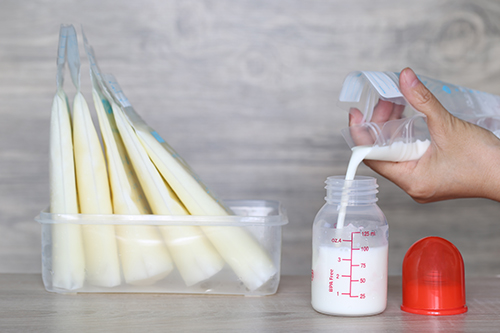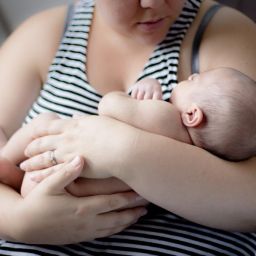1) Women with larger breasts make more milk.
The size of a woman’s breasts does not determine how much milk she will make. However, women do have different storage capacity in their breasts. Storage capacity is the amount of milk in a woman’s breasts when they are at their fullest. When a woman’s breasts become full this sends a signal to slow milk production. A woman with large storage capacity may be able to remove milk fewer times per day without it decreasing her production.
2) I have flat nipples, so I must use a nipple shield to breastfeed.
Having an efficient latch is determined by the pliability of your skin and breast tissue. You may have flat nipples, but your baby can still most likely get enough breast tissue in his mouth for a successful latch. A woman may also have adhesions or fatty tissue near the nipple. If a baby is latching properly, they may be able to break up these internal adhesions allowing the nipple to evert naturally. Your nipple shape can also be distorted by excess edema during pregnancy and from intravenous fluids given in labor. Many women will see an improvement with this within 1-2 weeks postpartum.
3) I have breast implants or have had breast augmentation, so I cannot breastfeed.
Many women who have breast implants or have had breast augmentation can breastfeed successfully. Factors including where the incision is, how much breast tissue/nerves were affected, and if the nipple was repositioned during the surgery can make a difference. In this situation, it would be best to meet with an IBCLC prenatally to discuss a plan.
4) My baby received a bottle or multiple bottles in the hospital now they cannot breastfeed.
With an evaluation from an IBCLC, we can work to bring your baby back
to the breast. The sooner and more frequently a baby is offered the breast the better.
5) I need to stop breastfeeding because my baby now has teeth.
Most babies are able to nurse without biting. If your baby does bite, there are ways to help prevent it from happening again.
6) If I get sick I should stop breastfeeding my baby until I am well again.
The best thing for your baby if you are sick is to continue to breastfeed. Your body makes antibodies against your illness which will pass through the breastmilk and protect your baby.
7) My newborn lost weight in the hospital so that means I do not make enough milk for my baby.
Most babies lose weight their first few days of life and it has nothing to do with your milk supply. The initial decrease in weight is usually linked to fluid loss in the baby. Continue to breastfeed and your baby should catch up. In the first few days of life, your baby’s stomach capacity is about the size of a small marble, so they do not need larger volumes at one time. Always follow up with your pediatrician if you have any concerns.
8) I cannot feel when I have a let-down, so I must not make enough milk.
Each woman has different sensations when they have a let-down, and some do not feel them at all. All are considered normal.
9) The older my baby gets the more and more milk they will consume.
Breastmilk composition changes to match your baby’s needs so they do not need an increased volume of breastmilk as they age. Typically, breastfed babies take between 3-5oz per feed. Even when they are close to 12 months! Remember that breastmilk is efficiently and easily digested.
10) During growth spurts, I need to give my baby formula because I do not have enough milk for my baby.
If you nurse as frequently and as long as your baby wants, your milk supply will adjust to your baby’s needs. No need for formula to be added.










